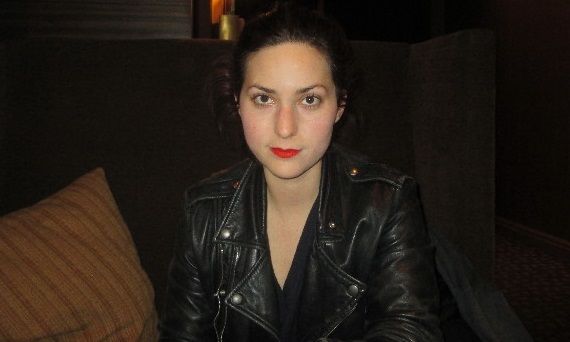 |
| Rebecca Zlotowski: "This maybe the film Grand Central - someone coming to this new dangerous masculine world and then be driven by desire." Photo: Anne-Katrin Titze |
Léa Seydoux and Tahar Rahim create electricity in Rebecca Zlotowski's precise and fiery Grand Central with powerful performances by Olivier Gourmet, Denis Ménochet and Camille Lellouche adding to the volatile mix.
Alfred Hitchcock's Strangers On A Train and Robert Bresson's Pickpocket come to mind as we meet Gary (Rahim) on a train to a place undisclosed and two noticeable cuts for Seydoux set the tone early - the cut of her shorts in Grand Central and the cut of her hair after the making of Abdellatif Kechiche's Blue Is The Warmest Colour.
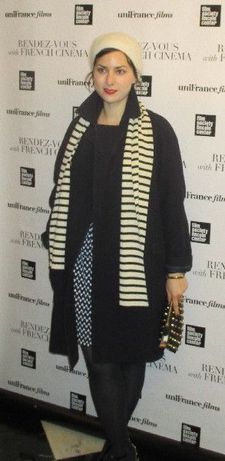 |
| Rebecca Zlotowski on scoring the film with her composer ROB: "It was a real challenge…" Photo: Anne-Katrin Titze |
Part prison one enters voluntarily, part futuristic neon-white belly of a nuclear whale, Zlotowski supplies us with the necessities of her character's past with nothing but a hesitant glance at the gates of the new frontier. "Have your ID ready," they say upon arrival at the plant, and ask "no criminal record?" People on the margins have their healthy bodies to sell and we enter the claustrophobic society of outlaws as though it were a western town. An electric rodeo bull, a beat-up car, alligator watching in a zoo and, with some luck, a great love story confute the invisible contamination.
Right when I sat down with Rebecca Zlotowski, at the Empire Hotel near Lincoln Center during New York's Rendez-Vous with French Cinema, for our conversation, the easy listening background music went up a notch in volume. Rebecca didn't miss a beat. Not surprisingly, when you consider that the ending of her film Grand Central contains the world in a number of sounds.
Rebecca Zlotowski: That's my favorite song!
Anne-Katrin Titze: Mine too! Let's start with the music in Grand Central and how you begin so powerfully with the music on the train.
RZ: I'm very obsessive with the sound. It's a long story. My composer ROB was already the composer on my first film [Belle Épine / Dear Prudence]. We really wanted to manage something that was about the contrast between what is inside the nuclear plant and what is outside. It was a real challenge because inside the nuclear plant it should be very oppressive with a hermetic feeling because everything is so closed and you have no natural light. I've been listening to this musician called Colin Stetson from the opening credits. He is a saxophonist and he does everything by himself. I have been very impressed by his songs. I loved them very much, but then when it was only this in the film, I think people wanted to commit suicide after, like, ten minutes. I wanted something very strong at the beginning that gives a feeling of the danger and the forbidden world we are driven to by this train. And then we wanted to create a contrast with the music.
AKT: You say the train leads to a "forbidden world". The title is Grand Central, as in Grand Central Terminal. It is not merely a station, but a terminal.
RZ: Terminal, yes. I read somewhere that, maybe it's what a western could be for French people. Western is about a stranger coming in a town or a stranger leaving his town. This maybe the film Grand Central - someone coming to this new dangerous masculine world and then be driven by desire.
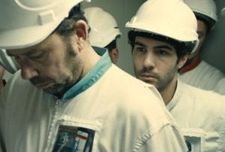 |
| Olivier Gourmet as Gilles with Gary: "I love the characters that give a lot, that are generous with their meanings." |
AKT: You hint at that Western world with the electric rodeo bull.
RZ: It's the imaginary we could have of an Americana. The way they spend their money and their free time and the entertainment that they can allow, was partly like the bull and the saloon. It was definitely an American suggestion and souvenir. But it was as well the danger that the torero fighter would have. I really wanted a bull. I really wanted to put people in an arena. Both those inspirations drove me to imagine this bull, kind of ridiculous as well, like a toy in a lunar park. It's not very masculine, more childish.
AKT: You introduce us to Olivier Gourmet's character through that electric bull. It's clear that you put a lot of thought into the way you introduce us to the characters. Back to the train which felt a bit like Strangers On A Train (1951) meets Pickpocket (1959).
RZ: Oh thank you. I love those two!
AKT: Then you show us the power plant through the window. In many films that would be marginal. Decor, an aside, a metaphor, and here it turns out to be the centre, the central part of your film. What is on the sidelines comes into the centre. Is this where you were going with your movements?
RZ: Yes, I did. I like your vision of the film because it's definitely like a back and forth between something we could imagine is the centre and something which is the periphery or the margin. And it's about marginal people. They move from one place to another, they are not sedentary. They really just travel all the time. I really wanted to have a huge contrast in the film between what was inside and so steep and so painful and so forbidden and outside would be a world of pulsing and passions and nature. The film is always like a confrontation. The partition is very binary.
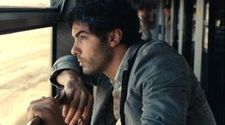 |
| Tahar Rahim as Gary: "I wanted something very strong at the beginning that gives a feeling of the danger and the forbidden world we are driven to by this train." |
AKT: The haircut that Léa Seydoux has in the film works for both of these binary fields. First you think it says something about her style - she has the short hair and wears very, very short denim cutoffs.
RZ: Everything is short.
AKT: Very short and revealing. Then, when the other woman, her friend and co-worker has to cut her hair because of the radiation, suddenly her haircut has this other meaning.
RZ: It was a decision. You are very keen to see this.
AKT: Is this why you wanted her to have that haircut?
RZ: Yes. I mean, no. First it was because Léa had cut her hair for Abdellatif Kechiche's film La Vie d'Adèle [Blue Is The Warmest Colour]. And I shot with her right after and the hair wasn't very long.
AKT: But no longer blue.
RZ: It was no longer blue and I didn't want her to wear a wig. I didn't want to fight with realism. She was like this at the time. Also, it totally made sense with the very difficult work for the women in this field.
AKT: She is working in the laundry of the power plant.
RZ: Yes. And it totally makes sense that the girls who work in this industry should have this. And I just noticed, like you - it shows you are a very good observer of the film - that when Camille Lellouche, the other actress, shaves her head because of the danger of radioactive contamination, that maybe Léa Seydoux's [character] had the same happen maybe six month before. I thought it was interesting. And also wanted Léa Seydoux to have a very virile femininity. I do not like feminine characters when they are too girly. When they are too girly, I don't accept their femininity in the same way I accept the femininity of a girl who likes her desire, who is free about her desire, is free about her sexuality. Sexuality was not the subject of the film that's why I really wanted to keep her costume to be so sexy, for instance. It was really a choice to say sexuality won't be the subject. Love will be the subject. And I thought the short haircut was part of the costume.
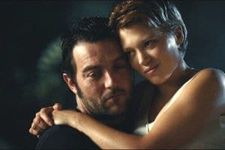 |
| Denis Ménochet as Toni with Léa Seydoux as Karole: "I really wanted to have the first fifteen minutes, twenty minutes of the film to put the subject on the table." |
AKT: Her relationship with Gary [Tahar Rahim] begins in front of everybody's eyes. She kisses him right there in the open. It is not a hidden world treated as a secret. That is very powerful.
RZ: That's true that they don't have any back-world, in French we say an Arrière-monde [Nietzsche's Hinterwelt]. I like that. First I think that in life sometimes we lie when we say that we have such an interior life. I think things are very even.
AKT: They are right there on the surface.
RZ: Yes, they are right there. It's like, oh yeah, she doesn't say a lot but I hear she thinks that. I love the characters that give a lot, that are generous with their meanings. And I think that we say a lot with our body language and even our actions. We say everything - what we are. I am very very fond of making an opening appealing and sexy. I really wanted to have the first 15 minutes, 20 minutes of the film to put the subject on the table. Then after that, the film is like a variation on the questions that have been asked during the first 15 minutes. So yes, I really wanted Léa Seydoux to be provocative with him and outspoken and not hiding from her husband [to be] because that was not the kind of relationship I wanted to describe. It just puts the subject on the table. That means the relation between the contamination and the love. The fact that love may be a disease in a very baroque way of thinking. A baroque motive.
AKT: A baroque motive in a very un-baroque setting. I have to ask you about the location. Where did you film this?
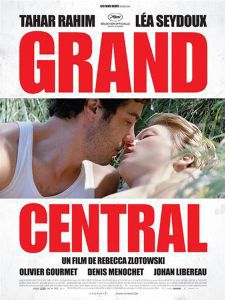 |
| Grand Central poster |
RZ: In Austria.
AKT: In Austria they allowed you to film in a nuclear power plant?
Rebecca notices my body language - I am leaning back from her.
RZ: Yes. The power plant was not in function anymore. I don't want cancer, no, no, no. It was not in function. We had the chance to find this place after Fukushima. We started to research maybe one year before Fukushima and we had nothing. We were looking for documentation and got nothing. Then after Fukushima there were people in Germany who started to talk. And we noticed that there was this nuclear plant that had never been in function in Austria.
AKT: It was never used?
RZ: Never. They just built it. And when they asked the Austrian people if they agreed or not with the nuclear plant, of course, they said no.
AKT: So you had the nuclear plant to film in, the whole place?
RZ: Yeah, just for ourselves.
Zlotowski was on Julie Gayet's Cinéast(e)s Action! French & American Women Filmmakers panel at the French Institute Alliance Française in New York. You can read more about that here.





















